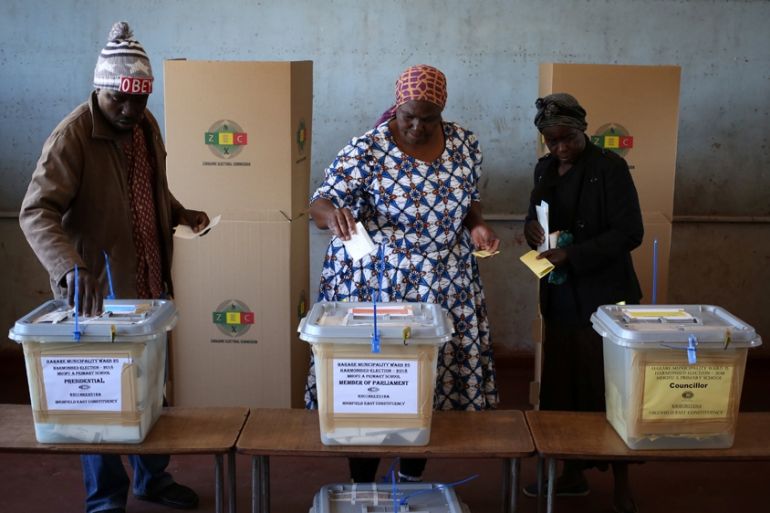Zimbabwe elections: Voters cast ballots in landmark polls
More than five million have registered to vote in first poll since 1980 without Robert Mugabe on the ballot.

Harare, Zimbabwe – Millions of Zimbabweans voted in the country’s first elections since independence in 1980 without the name of long-time leader Robert Mugabe on the ballot.
Polling stations opened at 7am (05:00 GMT) on Monday and closed at 7pm (17:00 GMT).
Long queues were reported at several polling stations across the country.
More than five million Zimbabweans have registered to take part in the landmark elections and pick their next president and members of parliament. A total of 10,985 polling stations have been set up across the country.
Twenty-three candidates, 19 men and four women, are running for the presidency – all for the first time. The figure marks the highest number of presidential hopefuls since the end of white minority rule in the country of 16 million people.
President Emmerson Mnangagwa, of the ruling ZANU-PF party, and Nelson Chamisa, of the opposition MDC Alliance, are seen as the top two contenders.
“This country is enjoying democratic space which has never been experienced before,” Mnangagwa said after casting his vote in the city of Kwekwe on Monday.
https://twitter.com/nelsonchamisa/status/1023872245209460737?ref_src=twsrc^tfw
His rival, MDC leader Chamisa said victory for his party is certain barring any “ballot mischief”.
“There seems to be a deliberate attempt to suppress and frustrate the urban vote,” Chamisa said on Twitter. “Good turnout, but the people’s will is being negated and undetermined due to these deliberate and unnecessary delays.”
A presidential runoff will be held on September 8 if a candidate does not secure more than 50 percent of the votes.
Official results are expected to be released by Saturday.
![Mnangagwa (L) and Chamisa (R) are seen as the top two contenders [Reuters]](/wp-content/uploads/2018/07/30186cdfe6314c87803e45eb1f423b24_18.jpeg?quality=80)
‘Peaceful’ polls
Many started to queue long before polls opened despite the chilly weather.
![Rudo Mhlanga, 32, unemployed [Hamza Mohamed/Al Jazeera]](/wp-content/uploads/2018/07/dfc89caad15046789a76c75cf55ae3ad_18.jpeg?quality=80)
Rudo Mhlanga, 32, arrived at her polling station in the capital, Harare, at 5:30am local time and voted at 7:30am.
“The queue was a bit long … I feel very happy. I really hope for a good outcome,” she told Al Jazeera.
Elson Gakaka, 59, said: “This election is important and I’m hoping now is the time that the people will be able to express their wishes and choose their own leader for this country.”
“In the past, elections have not always been good; there would be pre- election violence between parties, there would be people dressed in regalia singing songs, but this time it’s different, it is peaceful here,” he added.
![Elson Gakaka, 59, self-employed [Hamza Mohamed/Al Jazeera]](/wp-content/uploads/2018/07/8fadda2b39154f078acd494206a58b78_18.jpeg?quality=80)
But for others casting their vote was not a smooth process.
“I have been told to go to another polling station because my name is not here,” Naomi Shoriwa, 32, told Al Jazeera. “I came here because it is where I registered. There’s nothing I can do.”
She was trying to cast her vote in the Mbare area of the capital, Harare.
Mugabe breaks his silence
Previous elections in Zimbabwe were marred by intimidation and threats but campaigning this time has been relatively peaceful.
Elections observers from the European Union and the United States have also been allowed to monitor the vote – the first time since 2002.
Mugabe, who ruled the landlocked southern African country for nearly four decades, cast his ballot with his wife, Grace, in the Highfield district of Harare.
He was forced to resign in November 2017 following an intervention by the army.
Days before the army’s move, Mugabe had dismissed his then-vice president and close aide Emmerson Mnangagwa.
The 75-year-old Mnangagwa was later named ZANU-PF leader and was sworn in as Zimbabwe’s president.
On the eve of the vote, Mugabe said he would not back his successor in the polls, accusing the ruling party’s leadership of “tormenting him”.
“I can’t vote for ZANU-PF. I can’t vote for those in power. I can’t vote for those who brought me into this state,” Mugabe, 94, told reporters gathered at his residence in the capital, Harare, on Sunday.
Mugabe said he would vote for 40-year-old Chamisa.
Follow Hamza Mohamed on Twitter: @Hamza_Africa
